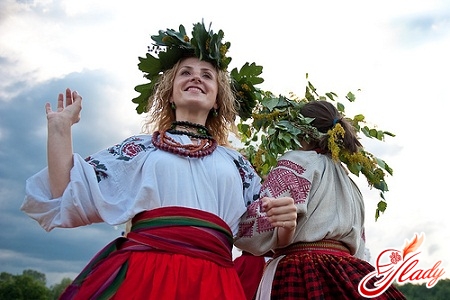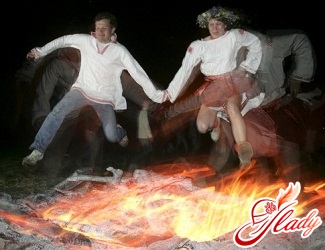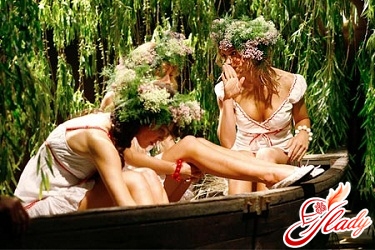 Well, here comes the blessed July,intending to gift us with both warmth and one of the most interesting holidays - the folk holiday of Ivan Kupala. It arose in the times of pagans and has very ancient traditions and rituals that are observed today by Eastern and Western Slavs in many parts of Europe. The folk holiday of Ivan Kupala is a very original celebration, which has a certain erotic flair. Researchers claim that the ancient pagan Slavs on the night before Ivan Kupala recklessly engaged in promiscuous sin, not really thinking about who and with whom they had sexual intercourse. Our ancestors were sure that such intercourse contributes to the purification of the soul from all sins. Well, group sexual acts were widely cultivated in the ancient era in ancient Rome and Greece, so there is no point in accusing our ancestors of immorality. In the end, it was not they who invented this ritual, but Ivan Kupala – a holiday that is now famous not for its orgies, but for a whole firework of very beautiful traditions and beliefs. For example, there are rumors that on the night of Ivan Kupala, a fern flower with magical powers blooms… But – first things first.
Well, here comes the blessed July,intending to gift us with both warmth and one of the most interesting holidays - the folk holiday of Ivan Kupala. It arose in the times of pagans and has very ancient traditions and rituals that are observed today by Eastern and Western Slavs in many parts of Europe. The folk holiday of Ivan Kupala is a very original celebration, which has a certain erotic flair. Researchers claim that the ancient pagan Slavs on the night before Ivan Kupala recklessly engaged in promiscuous sin, not really thinking about who and with whom they had sexual intercourse. Our ancestors were sure that such intercourse contributes to the purification of the soul from all sins. Well, group sexual acts were widely cultivated in the ancient era in ancient Rome and Greece, so there is no point in accusing our ancestors of immorality. In the end, it was not they who invented this ritual, but Ivan Kupala – a holiday that is now famous not for its orgies, but for a whole firework of very beautiful traditions and beliefs. For example, there are rumors that on the night of Ivan Kupala, a fern flower with magical powers blooms… But – first things first.
History of the holiday of Ivan Kupala
History of the holiday of Ivan Kupala, or Ivanovdays, is quite long. It arose before the spread of Christianity in Europe and initially fell on the top of summer, on the days of the summer solstice - from the twentieth to the twenty-second of June. In those days, the ancient pagans worshiped many gods, among whom was the god of fertility Kupalo. The legend-tale about the holiday of Ivan Kupala says that this god was separated from his own sister in childhood. And then, turning into a beautiful young man, he took her as his wife, unaware of the blood relationship. Subsequently, having learned about this, the brother and sister could not bear the truth and drowned themselves. After paganism was supplanted by Orthodoxy, changes occurred in the history of the holiday of Ivan Kupala. It was associated with the name of St. John the Baptist or John the Baptist, and timed to coincide with his birthday. At first it was celebrated on the twenty-fourth of June, and after the transition to the new calendar style, it began to be celebrated on the seventh of July. And thus lost its connection with the summer solstice. Ivan Kupala lost the connection with the solstice, but preserved its ancient traditions (except for the sin of promiscuity). And today it is almost the brightest and most colorful celebration, which is celebrated in almost all of Europe. And it takes place at night on the eve of Ivan Kupala in a very interesting and fun way. We will now talk in more detail about what happens on this night.
Night on Ivan Kupala. Rituals
 The rites of Ivanov's day are associated with fire, water andтравами. Язычники считали, что огонь и вода, — это природные силы, влияющие на плодородие. Раньше подготовка к празднику начиналась за несколько дней до него. В эти дни изготавливалось чучело Купалы, которое затем устанавливалось на возвышении. Накануне праздника чучелу преподносились различные угощения, водили вокруг него хороводы и пели песни. После праздника чучело Купалы либо сжигали, либо топили в каком-нибудь водоёме. Вообще песни на праздник Ивана Купала пелись повсеместно, и выглядело это очень красиво и лирично. Пели их девушки, опуская в речную воду венки из трав с зажжёнными лучинами. Если такой венок сразу же тонул, это означало, что избранник девушку не любит. Если он плыл долго и далеко, — девушке суждено большое счастье. Если лучинка на нём сразу же гасла, — хозяйку венка ожидала смерть, если же она неустанно горела, — очень долгая жизнь. Пели много песен на праздник Ивана Купала и во время прыжков через зажжённый из жертвенных трав костёр. Такой костёр считался очищающим. Вокруг него танцевали, через огонь прогоняли домашний скот, дабы защитить его от мора и болезней, в нём сжигали снятые с больных детей рубашонки, чтобы вместе с ними уничтожить и болезнь ребёнка. Молодёжь и детвора, прыгая через костёр, изо всех сил старались подняться над ним выше других. Это означало, что человека ждёт большое счастье. Основная часть обрядов Ивана Купала сохранилась до нашего времени и приходится на ночь перед седьмым июня. В эту ночь, как мы уже упоминали, по сказке о празднике Ивана Купала, расцветает папоротник. По поверью, если этот удивительный огненно красный цветок найдут парень и девушка, то брак их непременно будет очень счастливым. Нашел его когда-то кто-нибудь, доподлинно неизвестно, но ведь поискать-то можно? А вдруг повезёт, и прекрасное папоротниковое чудо подарит молодым людям возможность долгого и безмятежного совместного счастья! Как ни странно, но в сказку эту влюблённые юноши и девушки верят и сегодня, отправляясь рыскать по лесам, в надежде найти цветок папоротника. И не только юноши и девушки верят. У цветка папоротника, раскрывающегося ровно в полночь всего на несколько мгновений, есть ещё одно волшебное свойство. По преданию, в эти мгновения можно увидеть все, даже спрятанные очень глубоко под землёй, клады, получить дар понимать язык животных и птиц и даже возможность становиться невидимкой. Вот и осаждают папоротниковые леса кладоискатели, надеясь обнаружить в них несметные сокровища и открыть в себе сверхъестественные способности. Одним словом, накануне Ивана Купала ночь напоена мистикой, любовной негой и невероятной таинственностью. Оно и неудивительно. Наши предки были уверены в том, что совершённые в день Ивана Купалы обряды имеют чудодейственную силу, способную сделать любого человека здоровым и счастливым. По поверью, накануне Ивана Купала ночью вся нечистая сила становится особенно активной, и, если, при помощи обрядов, от неё защититься, то человек убережёт себя и своих близких от всевозможных напастей и несчастий в будущем. Люди пели песни-молитвы русалкам, устилали пороги и подоконники крапивой, чтобы уберечься от ведьм, собирали и высушивали травы, отпугивающие всякую нечисть и болезни. Вообще, день Ивана Купалы обрядами многими своими обязан вере язычников-славян в то, что в ночь перед праздником травы наполняются чудодейственной силой, деревья становятся живыми и перемещаются с места на места, а ведьмы, колдуны, русалки и лешие всяческие стараются сделать людям разные пакости. Ложиться спать во всей этой круговерти нельзя, — можно подвергнуться влиянию нечисти и заполучить множество неприятностей. Поэтому в ночь на Ивана Купала праздники продолжались до утра. Люди пели, водили хороводы, купались в реке, обмывались росой, прыгали через костёр до самого рассвета. Массовое купание – один из главных обрядов Иванова дня. Славяне верили, что в ночь накануне праздника водоёмы покидают водяные и русалки, поэтому можно безбоязненно купаться в них вплоть до Ильина дня.
The rites of Ivanov's day are associated with fire, water andтравами. Язычники считали, что огонь и вода, — это природные силы, влияющие на плодородие. Раньше подготовка к празднику начиналась за несколько дней до него. В эти дни изготавливалось чучело Купалы, которое затем устанавливалось на возвышении. Накануне праздника чучелу преподносились различные угощения, водили вокруг него хороводы и пели песни. После праздника чучело Купалы либо сжигали, либо топили в каком-нибудь водоёме. Вообще песни на праздник Ивана Купала пелись повсеместно, и выглядело это очень красиво и лирично. Пели их девушки, опуская в речную воду венки из трав с зажжёнными лучинами. Если такой венок сразу же тонул, это означало, что избранник девушку не любит. Если он плыл долго и далеко, — девушке суждено большое счастье. Если лучинка на нём сразу же гасла, — хозяйку венка ожидала смерть, если же она неустанно горела, — очень долгая жизнь. Пели много песен на праздник Ивана Купала и во время прыжков через зажжённый из жертвенных трав костёр. Такой костёр считался очищающим. Вокруг него танцевали, через огонь прогоняли домашний скот, дабы защитить его от мора и болезней, в нём сжигали снятые с больных детей рубашонки, чтобы вместе с ними уничтожить и болезнь ребёнка. Молодёжь и детвора, прыгая через костёр, изо всех сил старались подняться над ним выше других. Это означало, что человека ждёт большое счастье. Основная часть обрядов Ивана Купала сохранилась до нашего времени и приходится на ночь перед седьмым июня. В эту ночь, как мы уже упоминали, по сказке о празднике Ивана Купала, расцветает папоротник. По поверью, если этот удивительный огненно красный цветок найдут парень и девушка, то брак их непременно будет очень счастливым. Нашел его когда-то кто-нибудь, доподлинно неизвестно, но ведь поискать-то можно? А вдруг повезёт, и прекрасное папоротниковое чудо подарит молодым людям возможность долгого и безмятежного совместного счастья! Как ни странно, но в сказку эту влюблённые юноши и девушки верят и сегодня, отправляясь рыскать по лесам, в надежде найти цветок папоротника. И не только юноши и девушки верят. У цветка папоротника, раскрывающегося ровно в полночь всего на несколько мгновений, есть ещё одно волшебное свойство. По преданию, в эти мгновения можно увидеть все, даже спрятанные очень глубоко под землёй, клады, получить дар понимать язык животных и птиц и даже возможность становиться невидимкой. Вот и осаждают папоротниковые леса кладоискатели, надеясь обнаружить в них несметные сокровища и открыть в себе сверхъестественные способности. Одним словом, накануне Ивана Купала ночь напоена мистикой, любовной негой и невероятной таинственностью. Оно и неудивительно. Наши предки были уверены в том, что совершённые в день Ивана Купалы обряды имеют чудодейственную силу, способную сделать любого человека здоровым и счастливым. По поверью, накануне Ивана Купала ночью вся нечистая сила становится особенно активной, и, если, при помощи обрядов, от неё защититься, то человек убережёт себя и своих близких от всевозможных напастей и несчастий в будущем. Люди пели песни-молитвы русалкам, устилали пороги и подоконники крапивой, чтобы уберечься от ведьм, собирали и высушивали травы, отпугивающие всякую нечисть и болезни. Вообще, день Ивана Купалы обрядами многими своими обязан вере язычников-славян в то, что в ночь перед праздником травы наполняются чудодейственной силой, деревья становятся живыми и перемещаются с места на места, а ведьмы, колдуны, русалки и лешие всяческие стараются сделать людям разные пакости. Ложиться спать во всей этой круговерти нельзя, — можно подвергнуться влиянию нечисти и заполучить множество неприятностей. Поэтому в ночь на Ивана Купала праздники продолжались до утра. Люди пели, водили хороводы, купались в реке, обмывались росой, прыгали через костёр до самого рассвета. Массовое купание – один из главных обрядов Иванова дня. Славяне верили, что в ночь накануне праздника водоёмы покидают водяные и русалки, поэтому можно безбоязненно купаться в них вплоть до Ильина дня.
Feast of Ivan Kupala. Signs and fortune-telling
 On the night of Ivan Kupala, lonely girlsThey tried to bewitch their betrothed by running naked around a rye field three times. They believed that their beloved would see them in a dream after this and would understand that he needed this particular girl. If the girl did not have a beloved, she would, before the day of Ivan Kupala, at night, completely naked, collect twelve different herbs from twelve fields. And then she would put them on her pillow in order to see in a dream the one who was destined for her by fate. For such fortune telling, you could use the Ivan-da-Marya flower plucked on the night of Ivan Kupala, which also scared away thieves if you put it in the corner of the house. Girls and young women would take a clean tablecloth and go with it to the meadow in the morning, where they would drag the tablecloth through the wet grass and then squeeze it out into some kind of dish. The dew collected from the tablecloth was used to wash the face and hands to become beautiful, beds and walls of houses were sprinkled to drive away evil spirits and get rid of domestic insects. On the day of Ivan Kupala, people, having made a wish, tried to climb over twelve fences so that this wish would come true. Women who had not had children for a long time jumped over a fire to cure infertility. Naked girls with loose hair collected willow grass, water lilies and balsam, which grant the ability to overcome all obstacles, allow you to open any doors and locks and drive out evil spirits from everywhere. Herbs from Ivanov's day, before drying, were consecrated in churches and then sick people were fumigated with them, used as amulets, thrown into a melted stove during a thunderstorm so that lightning would not strike the house, with their help they bewitched and bewitched a person.
On the night of Ivan Kupala, lonely girlsThey tried to bewitch their betrothed by running naked around a rye field three times. They believed that their beloved would see them in a dream after this and would understand that he needed this particular girl. If the girl did not have a beloved, she would, before the day of Ivan Kupala, at night, completely naked, collect twelve different herbs from twelve fields. And then she would put them on her pillow in order to see in a dream the one who was destined for her by fate. For such fortune telling, you could use the Ivan-da-Marya flower plucked on the night of Ivan Kupala, which also scared away thieves if you put it in the corner of the house. Girls and young women would take a clean tablecloth and go with it to the meadow in the morning, where they would drag the tablecloth through the wet grass and then squeeze it out into some kind of dish. The dew collected from the tablecloth was used to wash the face and hands to become beautiful, beds and walls of houses were sprinkled to drive away evil spirits and get rid of domestic insects. On the day of Ivan Kupala, people, having made a wish, tried to climb over twelve fences so that this wish would come true. Women who had not had children for a long time jumped over a fire to cure infertility. Naked girls with loose hair collected willow grass, water lilies and balsam, which grant the ability to overcome all obstacles, allow you to open any doors and locks and drive out evil spirits from everywhere. Herbs from Ivanov's day, before drying, were consecrated in churches and then sick people were fumigated with them, used as amulets, thrown into a melted stove during a thunderstorm so that lightning would not strike the house, with their help they bewitched and bewitched a person.
Day of Ivan Kupala in different countries
Many rituals and traditions are similar to thoseand the Ivan Kupala holidays, exist in other countries as well. In Poland it is called "Sobotki", in Lithuania - "Lado", in Ukraine - the holiday of Kupala. Some nations dance in circles around a decorated willow on this day, some climb a mountain and arrange a witches' sabbath there, some burn sacred bonfires, bake festive pies and drink champagne... In many countries, one of the main characters of the mystical pre-bathing nights are mermaids. These insidious girls, possessing unearthly beauty, take human form on the night before the holiday, come out of their ponds and enchant the men they meet. True, not for long. The spell wears off after Ivan Kupala Day has passed. Ivan Kupala Day is an unusually interesting, cheerful and colorful holiday. It is no wonder that it is celebrated with great pleasure even today. It seems that we are not superstitious today, but we still want a fairy tale. And then, who knows, what if the night on the eve of Ivan Kupala really does have mystical properties? What if the fern blooms in the forest, and witches wander among people, turning into beautiful girls? After all, what doesn't happen in this world! So we go jump over the fire. Maybe after that we'll be very lucky! We recommend reading:









